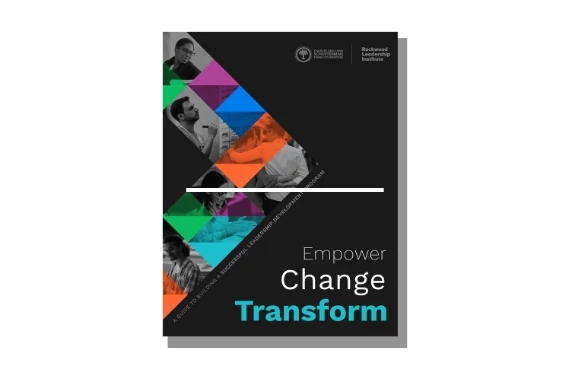Effective leadership is essential for driving meaningful, lasting change.
Effective leadership is more than hard skills and outcomes; it also requires a foundational capacity for growth and transformation.
This philosophy is at the core of the Schusterman Fellowship, our signature Jewish leadership development program. With input from experts across the Jewish leadership development and education sectors, we identified seven common competencies that have helped our Fellows strengthen their capacity to successfully lead their organizations and communities—regardless of their unique skills, challenges and backgrounds.
We believe leaders across all sectors can benefit from these competencies. As part of our ongoing commitment to sharing our learnings, we codified our leadership competency model here with descriptions of the Jewish traditions that inspired our thinking and real-world examples from Schusterman Fellows.
We offer our competency model as a guide to help any leader strengthen their leadership with the skills to build a more vibrant, just and inclusive future.
About the Schusterman Fellowship
The Schusterman Fellowship supports, cultivates and invests in exceptional Jewish leaders committed to building and sustaining Jewish nonprofits and Israeli civil society. Our 18-month leadership development program and lifelong fellowship community offer rising executive-level professionals the opportunity to develop as authentic, dynamic leaders through a robust curriculum, a cohort of peers and guidance from top coaches and experts.
What's Inside
Learn
about the seven competencies leaders can embrace for effective, sustainable leadership.
Listen
to real-life stories from leaders who practice these competencies in their work.
Practice
these competencies today using thoughtfully designed exercises to help you get started.
Our Leadership Competency Model
Our competency model groups seven competencies into four themes:
- Leading Self, which focuses on cultivating the inner leader.
- Leading Others, which delves into ways to support and empower teams and communities.
- Leading Systems, which explores how to drive structural change.
- Leading Sustainably, which ensures long-term leadership is manageable and energizing.
As a Jewish leadership development program, our work is inspired by ancient and new Jewish teachings, perspectives and experiences.
Below, you can learn more about the competencies, hear personal reflections from Schusterman Fellows about how they practice these competencies in their own lives and work, and access exercises to help start practicing these competencies today.
While we present our themes as linear, we see them as highly interconnected. We do not expect leaders to perfect one set of competencies before moving on to the next. Instead, we encourage leaders to build multi-dimensional skills throughout their careers and to tailor their efforts based on their own strengths and growth edges.
Charles and Lynn Schusterman Family Philanthropies welcomes the expression of personal thoughts and reflections in our Resource Hub. Each reflection included in this resource expresses its author’s opinion and does not necessarily represent the views of our organization or our partners.

Leading Self
The art of leading begins with turning inward.
Self-Aware
We ground our leadership philosophy in the belief that effective leadership reflects our own unique perspectives, styles and strengths. Because each leader is different, there is no “right way” to showcase leadership.
Before leaders can harness their distinct talents, they need to be able to accurately assess their own strengths and weaknesses and understand how their emotions and behaviors affect those around them. An essential aspect of leading from a place of authenticity for Jewish leaders is articulating their own Jewish leadership story and experience.
— Rooted in Jewish Tradition —
An example of cultivating self-awareness is the Jewish practice of cheshbon hanefesh (accounting for the soul). Engaging in cheshbon hanefesh means taking part in personal introspection. While practicing cheshbon hanefesh can happen anytime, people typically practice it throughout the month before Rosh HaShanah (the Jewish New Year) begins. Some customs during this month include setting kavanot (intentions) and asking for and granting forgiveness.

Based in Australia, Brandon runs a consultancy offering services in facilitation, leadership development and psychotherapy. As a facilitator and leadership development adviser, Brandon serves as the Chief Design and Facilitation Officer of LaunchPad Australia and is the Content Consultant and Facilitation Adviser for ROI Community. As a therapist, he works with individuals and couples navigating trauma, grief and relationship challenges.
“With self-awareness, I can bring a greater sense of empathy and humanity to my work because I am no longer seeing others as I am but rather as they are.”

Based in the United States, Yolanda has over 20 years of experience working with public agencies and non-profit organizations to promote equity and inclusion. She currently leads these efforts at the Union for Reform Judaism, which, as the largest Jewish movement in North America, engages approximately 1.8 million Reform Jews in building a more whole, just and compassionate world.
"Resiliency is what helps us stay in the action, even when things are their hardest and most controversial."
Resilient
All leaders must endure waves of highs and lows in their work and lives. It is easy to say the most effective leaders are the ones who know how to stay calm under pressure and keep themselves and their teams motivated. But, too often, leaders are expected to perform without the necessary tools and space to build their resilience.
Leaders build resilience by first understanding their emotions, then regulating them. It involves identifying when they need help and asking for it. Through a balance of evaluation and action, leaders can overcome challenging moments and pursue their goals.
Tools for resiliency include resources to delegate and manage more effectively, self-care practices that provide stability, and forming partnerships with colleagues and peers.
— Rooted in Jewish Tradition —
In the Schusterman Fellowship, one way we ask our Fellows to practice resilience is through the ancient Jewish practice of chevruta (partnership), where two people engage regularly in deep learning and conversation. The partners in every chevruta build structure into their lives through routine study and create a partnership that provides strength through mutual care and accountability.
Collect Anonymous Feedback
Self-Aware
Conduct an informal 360 review process by collecting anonymous feedback from others about your leadership habits. Ask a group of peers, direct reports or supervisors what they think you do best and what they think you should delegate to others. Next, compare their answers to your own assumptions about yourself. Find one way to take action on what you learn.
Build a Self-Care Routine
Resilient
A marathon is impossible to win without routine training. Likewise, it is vital to practice resilience during times of stress and calm. Think about what elements of self-care you abandon first when overwhelmed. Then, schedule times to practice that self-care regularly for a month. By making self-care a habit, you can tap into the practice when you need it most.
Finding Self With Spirituality
Book by Sarah Hurwitz
Sarah Hurwitz, Schusterman Fellow and former speechwriter for Michelle Obama, feels a profound connection with her Jewish faith. In her book, Here All Along, Hurwitz shares her journey to finding the richness of Judaism, and how her quest helped her better understand herself.
How To Overcome Self-Doubt
Podcast Interview with Kevin Cokley
Self-doubt is a universal experience, one that can be corrosive to confidence if left unchecked. In this episode of Hidden Brain, Psychologist Kevin Cokley explains the effects of self-doubt and shares methods for turning even the most negative voices in leaders’ heads into allies.
Telling Your Story of Self
Article by John Light
We all have a compelling story to tell that can move others. Founded in the teachings of Marshall Gantz, Lecturer at the Harvard Kennedy School of Government, this article explores the “why” of organizing and the art of transforming values into action through stories.
Embracing Change, from Intent to Action
Video of Robert Kegan
The gap between thinking and doing can feel expansive when it is time for people to commit to change. In this presentation, Professor and Psychologist Robert Kegan explores the space linking genuine intention with achievement—and how to bridge the gap between.
Leading Others
When leaders show up and communicate effectively, they have a profound impact on the people they lead and the people they serve.
Sense of Belonging
When leaders bring their full selves to their work, they are better able to grow and influence, more effectively rallying their teams and communities. An effective leader models this behavior and creates an environment where those around them can do the same. This includes ensuring all voices are heard and seeking various opinions and ideas.
Effectively cultivating a Sense of Belonging requires leaders to assess their own identity and position and how their implicit biases influence and inform their leadership. This means being willing to shift habitual ways of thinking and accompanying well-meaning words with actions that reinforce them. It also means co-creating safe, equitable spaces where everyone, especially those who have been historically marginalized, feels safe to bring their full selves and engage in productive conversations across difference.
When people feel like they are part of something larger than themselves, they feel proud of their participation and motivated to continue contributing to the collective effort. They are also more likely to offer new ideas and honest opinions that they may otherwise never bring up and positively contribute to the work. Helping people feel like they belong to a team and to a larger purpose, is one of the most important actions a leader can take.
— Rooted in Jewish Tradition —
Living out the Jewish value of derekh eretz (treating others with dignity and respect) is essential to practicing Sense of Belonging. For leaders of Jewish communities, this means shaping inclusive Jewish spaces so that everyone who seeks a connection to Jewish life can find meaning and experience a sense of belonging. For example, the SRE Network created the first standards to prevent and address gender-based discrimination and harassment in Jewish workplaces and communal spaces To date, 165 Jewish organizations have adopted these standards.

Based in Israel, Abigail has worked as an educator and organizational leader for over 20 years, with a focus on deepening people’s Jewish experiences while also promoting deep pluralism. Together with Rabbie Gringas, Abigail co-wrote Stories for the Sake of Argument, a collection of 24 stories designed to help readers disagree. The two collaborators founded and lead the initiative For The Sake of Argument, which has trained over 1,800 education professionals on leading healthy arguments that create deep educational engagement.
“To truly secure a sense of belonging, we need to reveal, not conceal our truths. We will only belong when we can be fully ourselves.”

Based in the United States, Coby draws from a wealth of intellectual and practical resources to help organizations understand their most intractable challenges in new ways. Through consulting Coby initially began working with AJWS, which invests more than $37 million annually in over 500 social justice organizations. After transitioning to his current role, Coby supported AJWS by implementing a strategic plan that sharpened its focus and furthered its impact on core human rights challenges.
“Only through exercising power with others can we call on our collective wisdom while fostering unity, pride of ownership, and trust among the people with whom we work.”
Power With
True leadership is not about exerting power—it’s about empowering others.
Effective leaders practice power with through delegation, collaboration and partnership. This requires showing humility, communicating through deep listening, and approaching ideas and experiences different from their own with empathy and curiosity.
Importantly, practicing Power With includes learning to speak out in the moments that call for it —and stepping back to give space to those who typically find none.
— Rooted in Jewish Tradition —
Kabbalah (Jewish mysticism) uses the term tzimtzum (making space) to describe God’s creation process. According to Kabbalah, God created the world by contacting divine light to make space for life. Likewise, it is easier for leaders to realize their vision when they make space for others to lead and contribute.
Solicit Diverse Viewpoints
Sense of Belonging
Consider who you consult on your team for big decisions. What patterns do you notice? What perspectives are you missing? Do the people you consult accurately represent the demographics, viewpoints and experiences of those in your organization and those who your organization serves? Make a plan to ensure that you include diverse voices when soliciting opinions.
Schedule Check-In Meetings
Power With
Schedule regular meetings with your direct reports to discuss their progress toward annual goals. Ask what you can start, stop and continue doing to support them professionally. Offer feedback on what they can start, stop and continue doing to meet their objectives. By listening to your employees’ needs and ambitions, you can support and empower them to take charge of their growth.
Identifying and Tackling Toxic Work Environments
Research by Donald Sull, Charles Sull, William Cipolli and Caio Brighenti
All leaders are responsible for addressing toxicity in their organizations, and pinpointing the elements of a toxic workplace is the first step to improving it. This research shares the five most common attributes of toxic workplaces leaders need to recognize.
Music: A Tool to Repair the World
Podcast Interview with Dr. Koach Frazier
In this episode of the Hashivenu podcast, Dr. Koach Frazier—an audiologist, rabbinical student and activist—shows music is much more than a pastime. Learn about music’s potential as a catalyst for personal and collective change.
Key Skills for Leading With Empathy
Podcast Interview with Brené Brown and Simon Sinek
Effective leaders know that making an impact means investing in their closest partners: their teams. In this episode of Work Life with Adam Grant, leadership experts Brené Brown and Simon Sinek discuss how leaders can put their people first, build trust and give productive feedback.
Framework for Open and Honest Communication
Book by Kimberly Loh, Diane Musho Hamilton and Gabriel Menegale Wilson
Intentional communication is vital to successful leadership, especially with uncomfortable topics or strong emotions. With the book, Compassionate Conversations, transform difficult conversations into opportunities to bridge divides and mend relationships.
Leading Systems
Leaders engage in wide-scale change by helping remodel the interlocking systems that shape our lives.
Creates
Effective leaders must be able to see beyond what has come before and picture what could be. Where others see roadblocks, effective leaders see opportunities to try something new.
Of course, leaders must be able to dream big and realize new realities. Our world is counting on capable leaders to articulate a compelling vision of the future and then create the teams and cultivate the buy-in to make it happen.
— Rooted in Jewish Tradition —
Jewish tradition tells us that Miriam and the Israelite women brought instruments as they fled Egypt (Ex 15:20-27 and Mekhilta d'Rabbi Yishmael 15:20:2), confident there would be miracles to celebrate on their journey. Once out of Egyptian hands, the women led the Israelites in music and dancing. Because of the women’s foresight, the Israelites could celebrate their freedom. Effective leaders see a future that does not yet exist and commit to ensuring it becomes a reality.

Based in Israel, Tehila seeks to build a philosophy and leadership for the country's ideological center through her role as Head of the Libba Center at The One Hundred Initiative. She has long been involved in promoting democracy and pluralism in Israel and Jewish peoplehood. Recently, she represented the Blue and White Alliance in Israel’s 24th Knesset.
“The choice to create is a choice to reimagine reality.”

Based in the United States, Becky and Laynie hold extensive experience facilitating Jewish learning and study as a healing and liberating experience, and building Jewish communities as spaces that encourage everyone to live a life reflecting their divinity and dignity. As the Co-Directors of the Trans Halakha Project (an initiative of SVARA: A Traditionally Radical Yeshiva), Becky and Laynie seek to empower and nourish transgender Jews whose experiences are not yet at the center of traditional Jewish learning.
“We do this work by transforming the way in which our trans experience is viewed and understood.”
Transforms
While every organization and community has unique challenges, many of the issues they face originate from norms in societies and institutions. For leaders to drive lasting change associated with these complex problems, they need to transform the very systems allowing them to endure.
Leaders who effectively transform systems engage in creative disruption to actively shift the status quo. In addition, they forge strategic partnerships within and across sectors that maximize collective impact through field building and movement building.
Transformative leadership is difficult, and the results are slow. For every step forward, there are two steps back. But when leaders stay committed to system-level transformation, the effect they have lasts for years and even generations to come.
— Rooted in Jewish Tradition —
For the first part of the Israelites’ journey through the desert, Moses served as the sole judge and jury. During a visit from Midian, Moses’ father-in-law, Jethro, witnessed the weight of Moses’ responsibility and encouraged him to democratize the judicial process by building a court of judges: the Sanhedrin (Exodus 18:13-26). With Jethro’s help, Moses transformed the Israelite system of governance.
Remove Mental Boundaries
Creates
Begin planning a vision for your organization by meeting with two of your closest partners. Choose a date for when you want to set your vision in motion. Then, take turns describing the vision by sharing for one minute each. Do this three times, and feel free to change your version of the outcomes each time. This exercise helps leaders dream big and allowing all ideas to emerge without self-censoring.
Consult an Outside Perspective
Transforms
Next time there is a problem to solve, ask someone outside your sector how they would approach the issue. Seeking fresh perspectives outside of your area of expertise can yield new ideas and transformational results—and even help build broader partnerships toward shared goals.
The Four Simple Rules of Systems Thinking
Book Excerpt by Dr. Derek Cabrera and Dr. Laura Cabrera
By understanding the distinction rule of systems thinking, as explained here by experts Derek and Laura Cabrera, leaders can begin to recognize mental patterns, including instinctive assumptions.
Welcoming and Shaping Change
Book by adrienne maree brown
Every leader holds the potential to understand and influence change. adrienne maree brown’s Emergent Strategy invites leaders to feel, map, assess and learn from change to shape their futures.
A Conversation on the Foundations of Leadership
Podcast Interview with Ronald Heifetz
In this episode of On The Balcony, Professor Ronald Heifetz, author of Leadership Without Easy Answers, explores how to build a lasting foundation of leadership that can successfully adapt to the unpredictable while still prioritizing impact, empathy and sustainability.
Implementing Sustainable Systems
Online learning site from the Waters Center for Systems Thinking
Systems thinking can help leaders develop strategies for overcoming complex challenges. This online studio provides resources for adopting systems and content to help leaders create lasting, effective systems within their organizations.
Leading Sustainably
Leadership is a rigorous practice. To drive change for the long haul, it is important to honor cycles of both work and rest.
Sustainable
A lot is expected from leaders working for social good, which can lead to one of the most common problems leaders must navigate: burnout. With organizations and the world facing persistent complex challenges, the race to keep up can lead to both physical and mental exhaustion.
Burnout among leaders affects everyone: When leaders cannot perform their roles, the people they lead struggle. To truly support the people they serve, leaders must rest, celebrate wins and nurture the vision that keeps them motivated. In doing so, they stay connected to the passion that allows them to move through pressure rather than give in to it.
Leading sustainably is essential to practicing all of the other leadership competencies in our model. When leaders work at a pace and scale they can maintain, they strengthen their ability to hone and practice the skills they need to lead effectively.
— Rooted in Jewish Tradition —
Shabbat, the seventh day of the week, is set aside for rest, celebration and reflection while the other six days are for routine work and production. Shmita, the sabbatical year, is the seventh year in the agricultural cycle when farmers pause all agricultural activity to allow the land time to regenerate. By designating time for both work and rest, leaders can connect with Jewish tradition and build a sustainable leadership practice.

Based in the United States, Ari is the spiritual leader of Skokie Valley Agudath Jacob, a growing, welcoming orthodox synagogue in Skokie, Illinois. Ari also co-founded Uri L'Tzedek (Awaken to Justice): The Orthodox Social Justice Movement, the Jewish Muslim Volunteer Alliance, and was the founding director of Or Tzedek, the teen institute for Jewish social justice. An internationally recognized thought leader on Jewish social justice, identity, and peoplehood, Ari has taught across Europe, Israel and North America.
"As a leader, I try to embrace these challenges, knowing they will test my mettle."
Rest and Reflect
Sustainable
When crafting an annual plan, designate times in each quarter for rest and reflection for your team. These could include setting aside days without meetings after large conferences or events or scheduling time for collective celebration and recognition after completing project milestones.
Tackling Complexity With a Both/And Mindset
Video by Andrion
The world is full of seemingly opposite concepts. When viewing these paradoxes, developing a “both/and” mindset is essential to dealing with complexity and leading sustainable change.
Healing Racialized Trauma Through the Body
Book by Resmaa Menakem
In My Grandmother’s Hands, trauma expert Resmaa Menakem unpacks how the body holds the generational anguish of racial oppression. (This book includes graphic descriptions of violence enacted by law enforcement.)
Ritualizing Rest
Book by Rabbi Abraham Joshua Heschel
An exploration of one of the most ancient elements of Jewish spirituality, Rabbi Abraham Joshua Heschel's book, The Sabbath, delves into the multitude of ways the practice of Shabbat provides meaning across and through time. In Heschel’s own words, “the Sabbaths are our greatest cathedrals.”
Sabbatical Planning Guide
Toolkit by R&R: The Rest of Our Lives
Leaders who plan their sabbatical early are better prepared for a successful sabbatical experience. This thoughtfully curated toolkit features sabbatical inspiration, sample timelines, funding opportunities, consultant services and more.
RELATED RESOURCES

Virtual Engagement Research
With virtual offerings here to stay, these findings provide useful insights into how these events can serve as successful tools to facilitate meaningful engagement with Jewish communal life.

A Guide Toward Diversity, Equity and Inclusion (DEI) in Data Collection
In this guide, we explore the impact data collection methods have on whose voices are heard—and whose are excluded. In addition, you'll find best practices for demographic data collection, with a myriad of example questions and answers.

Leadership Development Guide
Created in partnership with the Rockwood Leadership Institute, our Leadership Development Guide is informed by our own program evaluations and offers practical advice for organizations looking to strengthen their leadership initiatives.


